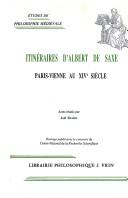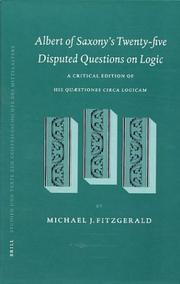| Listing 1 - 7 of 7 |
Sort by
|
Book
ISSN: 00675024 ISBN: 3402039273 9783402039274 Year: 1989 Volume: 32 Publisher: Münster: Aschendorff,
Abstract | Keywords | Export | Availability | Bookmark
 Loading...
Loading...Choose an application
- Reference Manager
- EndNote
- RefWorks (Direct export to RefWorks)
Beweging (Filosofie) --- Mouvement (Philosophie) --- Movement (Philosophy) --- 116 --- 1 <38> ARISTOTELES --- 1 ALBERTUS DE SAXONIA --- #GROL:SEMI-1'04/14' Beit NF --- Beweging. Ontwikkeling. Wording. Actio in distans --- Griekse filosofie--ARISTOTELES --- Filosofie. Psychologie--ALBERTUS DE SAXONIA --- 1 ALBERTUS DE SAXONIA Filosofie. Psychologie--ALBERTUS DE SAXONIA --- 1 <38> ARISTOTELES Griekse filosofie--ARISTOTELES --- 116 Beweging. Ontwikkeling. Wording. Actio in distans --- Scholasticism --- Science, Medieval --- Medieval science --- Theology, Scholastic --- Philosophy --- Philosophy, Medieval --- Albertus, --- Aristotle. --- Aristoteles. --- Albert, --- Alʹbert, --- Alberto, --- Albertus de Saxonia, --- Альберт, --- Aristotle --- Albertus, - de Saxonia, - -1390 --- Aristotle. - Physics

ISBN: 2711610608 9782711610600 Year: 1991 Volume: 69 Publisher: Paris: Vrin,
Abstract | Keywords | Export | Availability | Bookmark
 Loading...
Loading...Choose an application
- Reference Manager
- EndNote
- RefWorks (Direct export to RefWorks)
Philosophy, Medieval --- Philosophie médiévale --- Congresses --- Congrès --- Albertus, --- Congresses. --- -Medieval philosophy --- Scholasticism --- Albertus de Saxonia --- -Congresses --- -De Saxe, Albert --- Philosophie médiévale --- Congrès --- Albert, --- Alʹbert, --- Alberto, --- Albertus de Saxonia, --- Альберт, --- Philosophy, Medieval - Congresses
Book
ISBN: 9004096191 9004451846 Year: 1994 Volume: 37 Publisher: Leiden ; New York ; Köln Brill
Abstract | Keywords | Export | Availability | Bookmark
 Loading...
Loading...Choose an application
- Reference Manager
- EndNote
- RefWorks (Direct export to RefWorks)
Logic [Medieval ] --- Logica [Middeleeuwse ] --- Logique médiévale --- Medieval logic --- Middeleeuwse logica --- Logic --- Logic, Medieval --- Logique --- Early works to 1800 --- Ouvrages avant 1800 --- Albertus, --- 1 ALBERTUS DE SAXONIA --- 16 --- -#GROL:SEMI-1-05'13' Albe --- Argumentation --- Deduction (Logic) --- Deductive logic --- Dialectic (Logic) --- Logic, Deductive --- Intellect --- Philosophy --- Psychology --- Science --- Reasoning --- Thought and thinking --- Filosofie. Psychologie--ALBERTUS DE SAXONIA --- Logica. Kennistheorie. Logische methodiek. Wetenschapsfilosofie --- Methodology --- Albertus de Saxonia --- 16 Logica. Kennistheorie. Logische methodiek. Wetenschapsfilosofie --- 1 ALBERTUS DE SAXONIA Filosofie. Psychologie--ALBERTUS DE SAXONIA --- De Saxe, Albert --- Logique médiévale --- #GROL:SEMI-1-05'13' Albe
Book
ISBN: 9789042920743 9042920742 Year: 2010 Volume: 9 Publisher: Leuven: Peeters,
Abstract | Keywords | Export | Availability | Bookmark
 Loading...
Loading...Choose an application
- Reference Manager
- EndNote
- RefWorks (Direct export to RefWorks)
Logic [Medieval ] --- Logica [Middeleeuwse ] --- Logique médiévale --- Medieval logic --- Middeleeuwse logica --- Logic --- Albertus, --- Albert of Saxony --- Early works to 1800 --- Logic - Early works to 1800 --- Albertus, - de Saxonia, - -1390 - Quaestiones circa logicam

ISBN: 9004125132 9004453482 Year: 2002 Volume: 79 Publisher: Leiden Boston Köln Brill
Abstract | Keywords | Export | Availability | Bookmark
 Loading...
Loading...Choose an application
- Reference Manager
- EndNote
- RefWorks (Direct export to RefWorks)
Logic --- Logicians --- Logique --- Logiciens --- Early works to 1800 --- Biography --- Ouvrages avant 1800 --- Biographie --- Albertus, --- 16 <09> --- Logica. Kennistheorie. Logische methodiek. Wetenschapsfilosofie--Geschiedenis van ... --- Albertus de Saxonia --- 16 <09> Logica. Kennistheorie. Logische methodiek. Wetenschapsfilosofie--Geschiedenis van ... --- De Saxe, Albert --- Logica. Kennistheorie. Logische methodiek. Wetenschapsfilosofie--Geschiedenis van .. --- Albert of Saxony --- Logica. Kennistheorie. Logische methodiek. Wetenschapsfilosofie--Geschiedenis van

ISBN: 1283128055 9786613128058 9027284202 9789027284204 9060323661 9789060323663 Year: 2003 Publisher: Amsterdam ; Philadelphia : B.R. Gruner,
Abstract | Keywords | Export | Availability | Bookmark
 Loading...
Loading...Choose an application
- Reference Manager
- EndNote
- RefWorks (Direct export to RefWorks)
As the title indicates the author presents a contemporary theory of consequence. In so doing he establishes a terminology that enables a description, interpretation and evaluation of medieval theory independently of medieval vocabulary.In the interest of better understanding the medieval writers the author puts himself in the position of the medieval scholar in Erfurt. The reader learns about the Erfurt schools and the controversal debate on the so-called modi significandi, using only texts that are known to have been available in Erfurt in the first half of the 14th century.The two tracts, a short epitome of Thomas Maulfelt and a comprehensive volume of Albert of Saxony represent the two most common tracts of this discipline, and are discussed on the basis of questions arising in the introduction. New conclusions can be reached about the scope and the goal of medieval consequence theory which is an original accomplishment of the high Middle Ages and its place in the history of logic.Der Ankündigung im Titel gehorchend stellt der Autor eine zeitgenössische Theorie zu Schlußfolgerung dar. Somit wird eine Terminologie erstellt, in der - unabhängig von der Fachsprache des Mittelalters - die verschiedenen Ausführungen zur Schlußfolgerungslehre des Spätmittelalters beschreiben, interpretiert und bewertet werden können.Um die mittelalterlichen Autoren Thomas Maulfelt und Albert von Sachsen zu verstehen, versetzt sich der Autor in die Perspektive eines Scholars im Erfurt der Mitte des 14. Jahrhunderts. Der Leser wird über die Schulsituation in Erfurt unterrichtet, er erfährt von der hitzigen Debatte um die modi significandi und blickt zur weiteren Erläuterung lediglich in solche Schriften, deren Vorkommen für die Mitte des 14. Jahrhunderts in Erfurt belegbar sind.Anhand von Fragestellungen, die sich aus dem Einleitungsteil ableiten, werden die zwei Traktate, die in Form, Inhalt und Umfang die zwei häufigsten Schrifttypen zur Schlußfolgerungslehre repräsentieren, untersucht. So ergeben sich zur Anwendungreichweite, zur Zielsetzung dieser Disziplin, die eine originäre Leistung des hohen Mittelalters ist, sowie zu ihrem Stellenwert in der Logikgeschichte neue Erkenntnisse.
Consequentia (Logic) --- Logic --- Argumentation --- Deduction (Logic) --- Deductive logic --- Dialectic (Logic) --- Logic, Deductive --- Intellect --- Philosophy --- Psychology --- Science --- Reasoning --- Thought and thinking --- Logic, Medieval --- History --- Methodology --- Maulfelt, Thomas, --- Albertus, --- Albert, --- Alʹbert, --- Alberto, --- Albertus de Saxonia, --- Альберт, --- Maulfelt, Thomas --- Albert de Saxonia --- Germany --- To 1500
Book
ISBN: 9789042920934 9782758400394 9782758400849 9789042921047 9042920939 9042921048 Year: 2008 Volume: t51 Publisher: Louvain-la-Neuve: Institut supérieur de philosophie,
Abstract | Keywords | Export | Availability | Bookmark
 Loading...
Loading...Choose an application
- Reference Manager
- EndNote
- RefWorks (Direct export to RefWorks)
Language and languages --- Thought and thinking --- Philosophy of mind --- Philosophy, Medieval --- Langage et langues --- Pensée --- Philosophie de l'esprit --- Philosophie médiévale --- Philosophy --- History --- Congresses. --- Congresses --- Philosophie --- Histoire --- Congrès --- Pensée --- Philosophie médiévale --- Congrès --- Albertus, --- Cosmology --- Aristotle. --- Philosophy [Medieval ] --- Albertus de Saxonia --- Aristotle --- Langage et histoire --- Language and languages - Philosophy - Congresses --- Thought and thinking - Congresses --- Philosophy, Medieval - Congresses --- Cosmology - Early works to 1800. --- Aristotle. - De caelo.
| Listing 1 - 7 of 7 |
Sort by
|

 Search
Search Feedback
Feedback About UniCat
About UniCat  Help
Help News
News